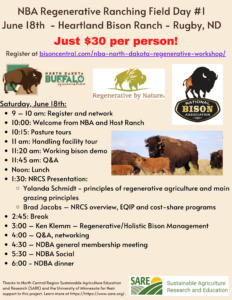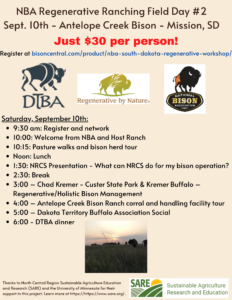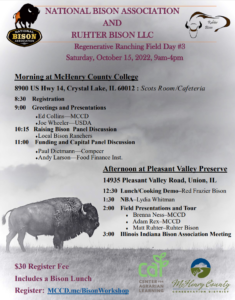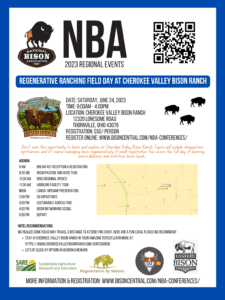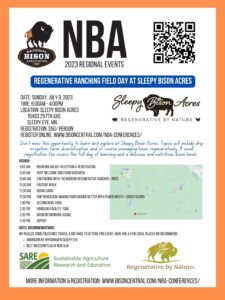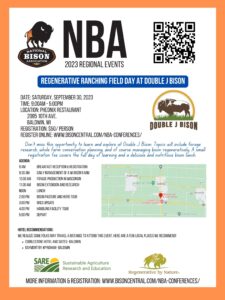Final report for ONC22-102
Project Information
The project that we are proposing would be a demonstration and outreach/education focused effort that will allow new, prospective and existing bison producers to tour six working bison farms and ranches across the north central region over the course of two summers that will also include expert speakers as to obtain first-hand knowledge on how to properly manage bison grazing and handling to maximize their regenerative potential as a livestock species. The bison species has evolved with North American grasslands for over 200,000 years and, as a keystone species in the region, has the potential to maintain soil health and fertility, improve carbon sequestration through the expansion of grasslands, all the while providing a valuable livestock component to working farms and ranches. These problems of soil health/fertility and atmospheric carbon impacts on climate change will be addressed through the rare opportunity to tour a working regenerative bison operation, which has been greatly hampered for the last two years due to the COVID pandemic, which will be further enhanced with the inclusion of presentations from expert speakers on a variety of sustainability topics. The north central region includes the largest bison-producing states in the world according to the USDA Ag Census.
The achievable objectives that will be offered through this project include direct, face-face holistic and sustainable bison management education/demonstration to an estimated 450 bison producers as well as resulting educational materials in print and video format. Outreach will be expanded as we plan to film these demonstration and presentations to offer remote learning to countless more bison producers by streaming these videos online. Producers will be educated on specific management and animal handling topics that will allow them to practice a more holistic and regenerative approach to agriculture on their own operations as a result of this project.
Cooperators
- (Educator)
- (Educator)
- - Technical Advisor (Educator)
- - Technical Advisor (Educator)
- (Educator)
- (Educator)
- (Educator)
- (Educator)
- (Educator)
- (Educator)
- (Educator)
- (Educator)
- (Educator)
- (Educator)
Research
Educational & Outreach Activities
Participation Summary:
Progress Report Update (3.01.23)
The National Bison Association's (NBA) Regenerative Ranching Field Days project held three separate Field Days as planned in the first year of the grant. Each event was held at a working bison operation in a different state and had excellent speakers and attendance. The NBA also partnered with the local respective regional bison association at each event to offer a venue for their members to gather, and to assist with promotion, local planning, etc. This approach worked very well and resulted in each event doubling as an association membership meeting and dinner, thereby adding value to the field days. Each event also included at least one USDA employee, mostly from the NRCS, as well as other regenerative and holistic agriculture specialists. Two of the three field days were filmed and are now available on the NBA's website for viewing. All three field days included farm/ranch tours and each of them featured presentations literally in the field during those tours, as well as a bison lunch which provided top-notch networking.
2022 Field Days
- June 18th - Heartland Bison Ranch - Rugby, ND
- September 10th - Antelope Creek Bison - Mission, SD
- October 15th - Ruhter Bison - Woodstock, IL
2022 Field Day Promotional Flyers
2022 Field Day Videos
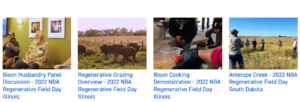
Links to 2022 Videos:
- Bison Husbandry Panel Discussion
- Regenerative Grazing Overview - Illinois
- Cooking Demonstration
- Regenerative Ranching Field Day - Antelope Creek
Progress Report Update (4.01.24)
The National Bison Association's (NBA) Regenerative Ranching Field Days project held three separate Field Days as planned in the second year of the grant. Each event was held at a working bison operation in a different state and had excellent speakers and attendance. The NBA also partnered with the local respective regional bison association at each event to offer a venue for their members to gather, and to assist with promotion, local planning, etc. This approach worked very well and resulted in each event doubling as an association membership meeting and dinner, thereby adding value to the field days. Each event also included at least one USDA employee, mostly from the NRCS, as well as other regenerative and holistic agriculture specialists. All three field days in 2023 were filmed and are now available on the NBA's website for viewing. All three field days included farm/ranch tours and each of them featured presentations literally in the field during those tours, as well as a bison lunch which provided top-notch networking.
2023 Field Days
- June 24, 2023 - Cherokee Valley Bison – Thornville, Ohio
- July 9, 2023 - Sleepy Bison Acres – Sleepy Eye, Minnesota
- September 30, 2023 - Double J Bison Ranch – Baldwin, Wisconsin
2023 Field Day Promotional Flyers
2023 Field Day Videos
Links to 2023 Videos:
Ohio Regenerative Ranching Field Day- Farm Tour
Ohio Regenerative Ranching Field Day- Handling Bison
Ohio Regenerative Ranching Field Day- Benefits of Associations
Ohio Regenerative Ranching Field Day- Silvopastures
Minnesota Regenerative Ranching Field Day - Full Length
Minnesota Regenerative Ranching Field Day- Recap
Wisconsin Regenerative Ranching Field Day- Recap
Learning Outcomes
how to care for the bison- new ideas on feeding, deworming, darting and organizing
Silvopasture- especially the discussion of the tree species to choose and what to consider when planning layout
bale rolling
drip irrigation
Project Outcomes
Progress Report Update (3.01.23)
Thanks to the three in-person field days that we conducted this year, The NBA estimates that 20%, or 22 individuals, have adopted at least some of the sustainability management recommendations that were presented at the events. Our post-field day survey indicates that 62% of attendees thought the field days were "excellent" and 31% deemed them "good". See the survey results here - 2022 SARE Field Day Survey Results
In terms of how our project has impacted stakeholder's participation in regenerative agriculture, we believe that having had the opportunity to tour and learn about a successful and viable regenerative ranching operation utilizing bison, complemented by the expert speakers who presented, attendees now have the knowledge base and vision to work towards being similarly regenerative-minded on their own operations.
Being just six months since the field days were conducted, we anticipate more bison producers to work towards sustainability and regenerative agriculture, which is supported by the filmed field days being available online for continued outreach and education. However, we are pleased with the turnout at the field days, thus far, and anticipate higher attendance in the coming year as this year's events were very well received and word of mouth is still an effective means of promotion in the relatively small bison community.
In a year of record inflation, those who are utilizing regenerative agriculture on their operations are finding that the ability to regenerate healthy grasslands, and soils, through proper bison grazing management are helping to offset the need for expensive hay and other feed. They are finding that rotational grazing is an effective means of parasite management and reducing the need for costly inputs. They are better able to manage drought in SD and ND thanks to proper grazing planning and management, which benefits the producer socially in reducing stress and financial hardship.
This project will continue to affect agriculture sustainability thanks to the networks that have been established at last year's field days. Each field day featured local expert-speakers who have in turn become a valuable regenerative resource to attendees to direct questions to. Further, by partnering with the regional bison association, attendees have another resource to rely on for more local issues. Our partnership also drew in more participants by offering a regional association members' meeting and dinner at the conclusion of the field day. We look forward to expanding our reach to three additional states - Ohio, Minnesota and Wisconsin - with more field days this year.
Final Report (5.22.24)
The National Bison Association's (NBA) Regenerative Ranching Field Days project held six separate Field Days in years 2022 and 2023 of the grant. Each event was held at a working bison operation in a different state and had excellent speakers and attendance. Events were held in South Dakota, North Dakota, Illinois, Ohio, Minnesota, and Wisconsin. The NBA also partnered with the local respective regional bison association at each event to offer a venue for their members to gather, and to assist with promotion, local planning, etc. The Dakota Territory Buffalo Association, North Dakota Bison Association, Illinois/Indiana Bison Association, Eastern Bison Association, Minnesota Bison Association and Wisconsin Bison Association all participated in this grant. This approach worked very well and resulted in each event doubling as an association membership meeting and dinner, thereby adding value to the field days. Each event also included at least one USDA employee, mostly from the NRCS, as well as other regenerative and holistic agriculture specialists. All 5 of 6 field days were filmed and are now available on the NBA's website for viewing. All field days included farm/ranch tours and each of them featured presentations literally in the field during those tours, as well as a bison lunch which provided top-notch networking.
Based on 2023 SARE Field Day Survey Results, 58% of attendees identified as farmers/ranchers, 12% as conservation or government employees, 4% as landowners, and the remaining attendees as "other".
The National Bison Association has opted to continue offering regional regenerative ranching conferences and began the 2024 season in Texas, and will cover Kansas, New Hampshire, and Colorado. The events will follow the field day model and exhibit a wide range of successful bison businesses across the United States and include expert speakers offering first-hand knowledge on how to holistically manage bison grazing and handling to maximize their regenerative impact as a livestock species. Bison have evolved in concert with North American grasslands for over 200,000 years and, as a keystone species in the region, has the potential to improve soil health and fertility, increase carbon sequestration through the expansion of grasslands, all the while providing a valuable livestock component to working farms and ranches across the continent.
To expand on one of the project outcomes previously mentioned, one major success story of the project was the partnership with the local bison associations. There are 15 state or regional bison associations across the nation, all operating independently, but working closely together toward their common cause. A vast majority of these organizations are volunteer-run and have not been able to meet the previous two years due to the COVID pandemic. All three field days included just such a reunion in the membership meeting and dinner held at the end of the field days. Farmers and ranchers who hadn't seen each other in over two years were able to reunite, share stories and learn about regenerative agriculture, all thanks to this project and the support of NCRSARE. They could not have done it without your help, and your support will result in support and inclusion from the bison community in your work and outreach.
Attendees were highly engaged and provided great feedback in survey results. Greatest value was identified as:
- Getting the opportunity to meet a wonderful group of people and listening to their authentic lessons and stories from the land.
- Silvopasture discussion, especially the discussion of the tree species to choose and what to consider when planning layout.
- Today's presentations were all excellent. Spearkers gave us some new ideas on feeding, deworming, darting and organizing. The grazing video was helpful too. Interesting and informative about the research being done with Bison. Everyone was willing to answer questions through the day.
- The information/education of the day. The level of variety in agriculture practices.
- Pasture walk — hearing ranchers talk about their pastures and handling facility.
